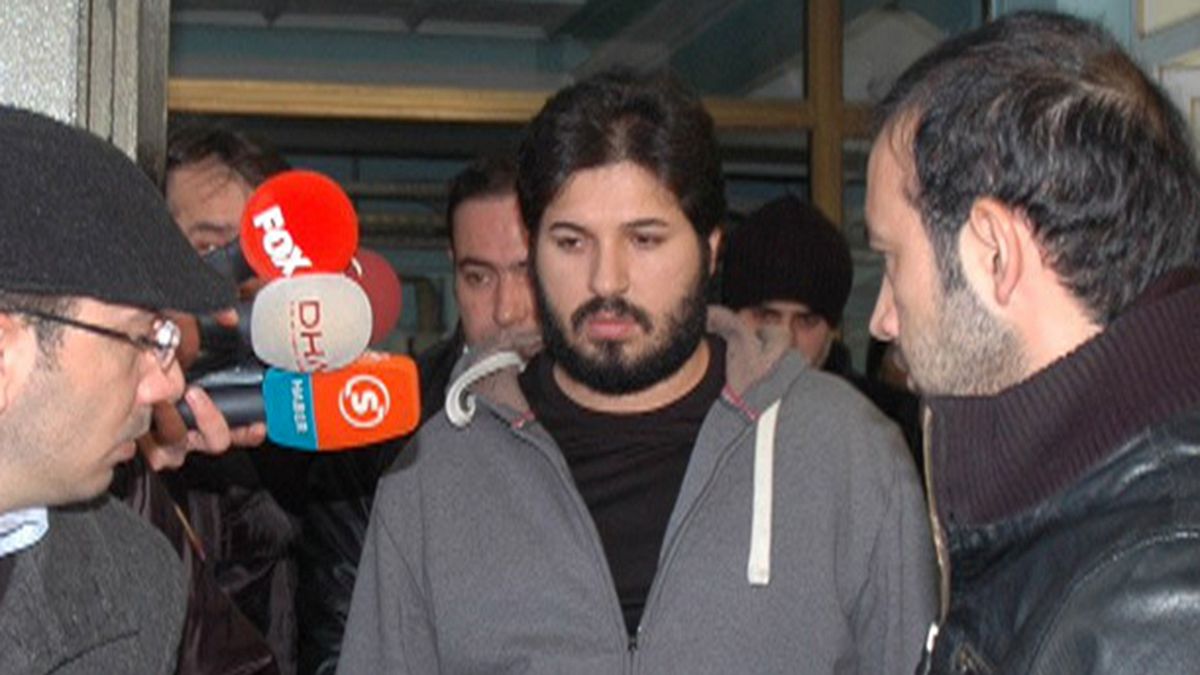A police operation in Istanbul at dawn on Tuesday has triggered a new political war in Turkey. At least 52 people including sons of ministers, the head of a state owned bank, the mayor of a large district of Istanbul and well known business people have been detained. It came as a shock not only to most ordinary Turks but also Prime Minister Erdogan, Interior Minister Muammer Guler and the rest of the cabinet.
The probe focuses on Halkbank, which, it’s claimed, has breached sanctions imposed by the United States on Iran. The second probe targets the son of government minister Erdogan Bayraktar, Abdullah Oğuz Bayraktar, who is accused of establishing a crime ring and accepting bribes from major firms in exchange for construction permits in areas that were the ministry’s responsibility. The third probe is into allegations that protected areas in Fatih district were illegally built on by construction in return for bribes. Demir is also accused of allowing the construction of a hotel near the route of the Marmaray, despite negative reports from engineers and state institutions. The motives behind the operation have been the subject of intense debate. The probe is believed to be the latest battle between the government and the Gülen Movement. During its 11 year rein, the Justice and Development (AKP) Party had a close alliance with the faith-based Gulen movement, which is believed to have a strong influentual presence in the police in the media.
AKP and the Gulen movement were allies during Turkey’s struggle to dismantle the military cabal, during which powerful generals were tried and imprisoned over charges of attempting to stage to a military coup; the so-called Ergenekon and Sledgehammer cases. The newpapers and television channels of the Gulen movement were instrumental in convincing the public while the police were pursuing their operations. This alliance earned the wrath of the secular elite over the years.
But it came to an abrupt end last month when the government decided to ban private preparation schools. In Turkey, students take examinations nationwide to qualify for the best high schools and, later, for the universities. The most successful and well-known prep schools are either managed or owned by companies affiliated with the Gulen movement. The prep schools are seen as centres of recruitment, enlisting followers and financial backers for the Gulen movement. But these schools have also wide public support because they increase the chances of students in rural areas of getting into top universities. The Gulen movement controls 20 per cent of the private education sector.
The Prime Minister’s decision to ban the prep schools was perceived as a declaration of war by the Gulen movement. Supported by a wide coalition of civil society the final decision on the fate of the prep schools was delayed. Under pressure, the government stepped back from the brink and declared that the final decision will be taken in two year’s time. But that hasn’t prevented a boiling over of hostility between the Gulen movement and supporters of the government. Social media sites have become a war zone between the two groups where, it seems, there were no rules of engagement.
Following the prep school controversy, a new major row erupted: Taraf Newspaper published documents compiled by the government on teaching officers. Especially in the Ministry of National Education, people were filed according to their political and religious affiliations. It was also revealed that in 2004 in a National Security Council Document, AKP government agreed on dismantling religious groups, including the Gulen movement. The movement regarded this as betrayal and dismantled the bridge between itself and the government. A columnist close to the government accused the Gulen Movement of establishing a “paralel state” and that the government will not stay indifferent to this.
The recent corruption case appears to be the latest thrust by Gulen against its bitter rivals in government. The movement is thought to have a strong influence in the police hierarchy, and it is believed some on the force actively support it and its leader Fethullah Gülen, who now lives in the United States.
The Turkish prime minister, Reccep Tayyip Erdogan said: “Turkey is not a country that can have operations or surgeries performed on it. Some people have guns and weapons, tricks and traps, but we have our God and that is enough for us. The nation is enough for us. They can stoop to whatever ugly methods they would like or engage with dirty alliances, but we will not bow to any threats, I will repeat this one more time here.” Erdogan has also come down harshly on Turkey’s top business group Koc Holding, believing it supported the Gezi protests in this summer. The group have been under financial scrutiny since July and is facing a tax fine of nearly 60 million Turkish Liras.
After the high profile anti-corruption operation there have been rumours claiming that the prosecutors looking into the case, Istanbul public prosecutors Celal Kara and Mehmet Yüzgeç, had been removed from the case. But the Minister of Justice Sadullah Ergin has denied the claims. However, five police chiefs were removed from Oofice in Istanbul, two of them had been running the case.
